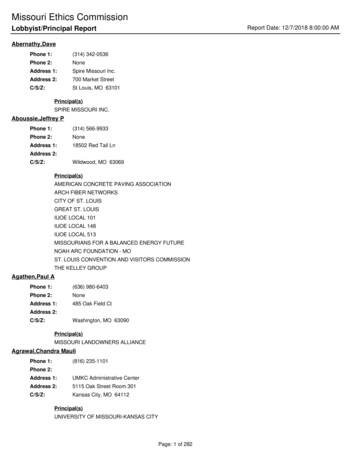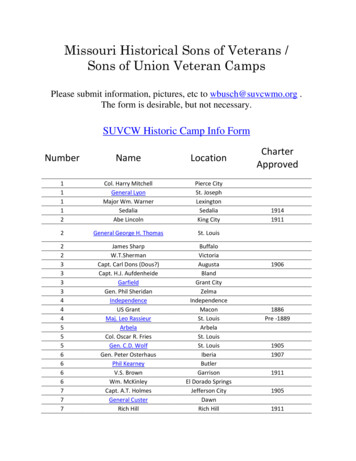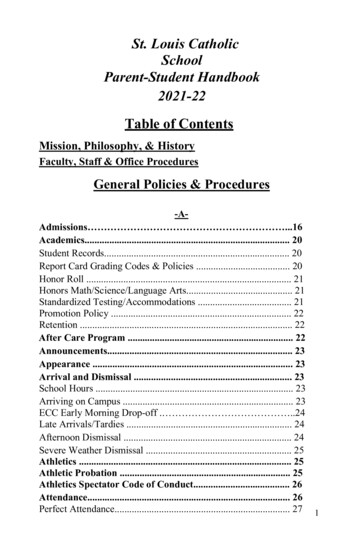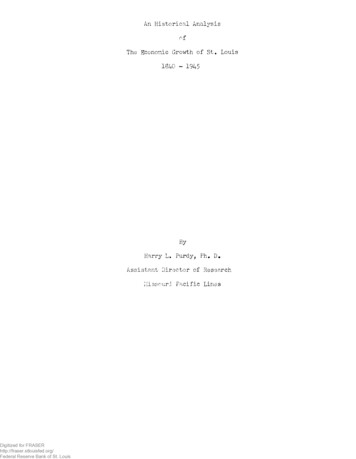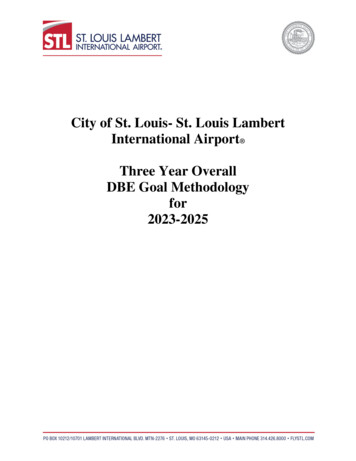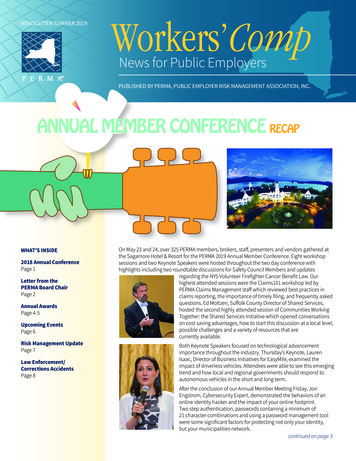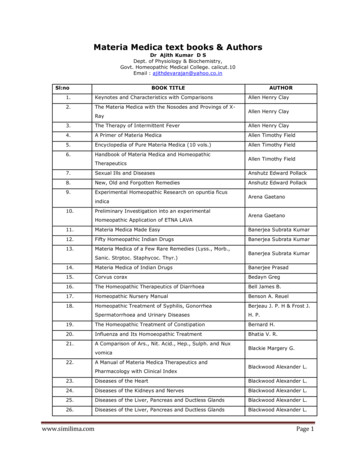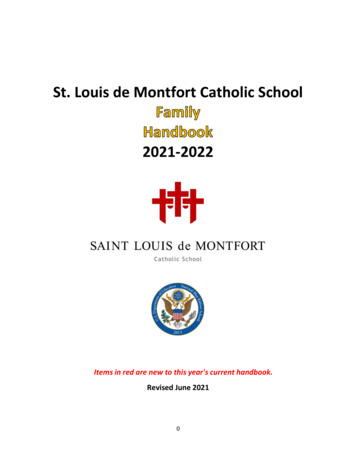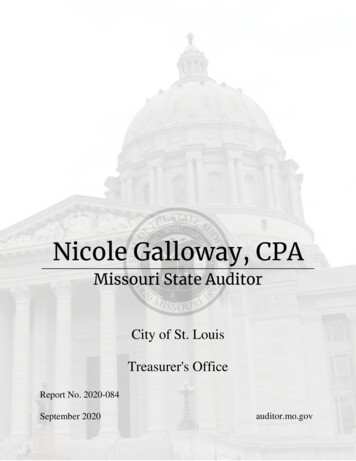
Transcription
City of St. LouisTreasurer's OfficeReport No. 2020-084September 2020auditor.mo.gov
September 2020Nicole Galloway, CPAMissouri State AuditorCITIZENS SUMMARYFindings in the audit of the City of St. Louis - Treasurer's OfficeBank Accounts andInvestmentsThe Treasury Division does not perform competitive procurement of servicesfor the deposit of most city funds. Also, division staff do not promptly preparebank reconciliations or timely resolve reconciling items on various bankreconciliations. In addition, division staff do not timely post investments toaccounting records or maintain documentation to support investmentdecisions. Division officials have not obtained an annual external audit ofinvestment activities and controls.College Kids Children'sSavings Account ProgramThe College Kids Children's Savings Account Coordinator does not preparea monthly list of liabilities to reconcile to the incentive bank account balanceand annual goals for collecting donations for the incentive funds are notestablished and analyzed.Procurement Procedures andContractsThe Treasurer's Office has not established policies and procedures for theselection of vendors providing goods and services. In addition, office staff didnot always solicit bids or proposals for goods and services, have notperiodically conducted a competitive selection process for variousprofessional services, and did not always maintain documentation supportingsome procurement decisions. The office does not always enter into writtencontracts when appropriate or monitor contracts effectively.Accounting Controls andProceduresReceipting procedures do not provide adequate control over paymentsreceived in the Treasury Division. The Treasurer's Office does not submitemployee leave records to the Comptroller's Office to maintain and reconcilewith the city's centralized leave records.In the areas audited, the overall performance of this entity was Good**The rating(s) cover only audited areas and do not reflect an opinion on the overall operation of the entity. Within that context, the ratingscale indicates the following:Excellent: The audit results indicate this entity is very well managed. The report contains no findings. In addition, if applicable, priorrecommendations have been implemented.Good:The audit results indicate this entity is well managed. The report contains few findings, and the entity has indicated most or allrecommendations have already been, or will be, implemented. In addition, if applicable, many of the prior recommendationshave been implemented.Fair:The audit results indicate this entity needs to improve operations in several areas. The report contains several findings, or one ormore findings that require management's immediate attention, and/or the entity has indicated several recommendations will notbe implemented. In addition, if applicable, several prior recommendations have not been implemented.Poor:The audit results indicate this entity needs to significantly improve operations. The report contains numerous findings thatrequire management's immediate attention, and/or the entity has indicated most recommendations will not be implemented. Inaddition, if applicable, most prior recommendations have not been implemented.
City of St. Louis - Treasurer's OfficeTable of Contents2State Auditor's ReportManagement AdvisoryReport - State Auditor'sFindingsOrganization and StatisticalInformation1.2.3.4.Bank Accounts and Investments . 4College Kids Children's Savings Account Program . 8Procurement Procedures and Contracts . 10Accounting Controls and Procedures . 15181
NICOLE GALLOWAY, CPAMissouri State AuditorHonorable Tishaura O. Jones, TreasurerCity of St. Louis, MissouriWe have audited certain operations of the City of St. Louis Treasurer's Office in fulfillment of our dutiesunder Section 29.200.3, RSMo. The State Auditor initiated audits of the City of St. Louis in response to aformal request from the Board of Aldermen. The city engaged KPMG LLP, Certified Public Accountants(CPAs), to audit the city's financial statements for the year ended June 30, 2019. To minimize duplicationof effort, we reviewed the CPA firm's report for the June 30, 2018 audit since the June 30, 2019 audit hadnot been completed. The scope of our audit included, but was not necessarily limited to, the year endedJune 30, 2019. The objectives of our audit were to:1.Evaluate the office's internal controls over significant management and financial functions.2.Evaluate the office's compliance with certain legal provisions.3.Evaluate the economy and efficiency of certain management practices and procedures,including certain financial transactions.Our methodology included reviewing minutes of meetings, written policies and procedures, financialrecords, and other pertinent documents; interviewing various personnel of the office, as well as certainexternal parties; and testing selected transactions. We obtained an understanding of internal controls thatare significant within the context of the audit objectives and assessed whether such controls have beenproperly designed and placed in operation. We tested certain of those controls to obtain evidence regardingthe effectiveness of their design and operation. We also obtained an understanding of legal provisions thatare significant within the context of the audit objectives, and we assessed the risk that illegal acts, includingfraud, and violations of applicable contract or other legal provisions could occur. Based on that riskassessment, we designed and performed procedures to provide reasonable assurance of detecting instancesof noncompliance significant to those provisions.We conducted our audit in accordance with the standards applicable to performance audits contained inGovernment Auditing Standards, issued by the Comptroller General of the United States. Those standardsrequire that we plan and perform our audit to obtain sufficient, appropriate evidence to provide a reasonablebasis for our findings and conclusions based on our audit objectives. We believe that the evidence obtainedprovides such a basis.The accompanying Organization and Statistical Information is presented for informational purposes. Thisinformation was obtained from the office's management and was not subjected to the procedures applied inour audit of the office.2
For the areas audited, we identified (1) deficiencies in internal controls, (2) noncompliance with legalprovisions, and (3) the need for improvement in management practices and procedures. The accompanyingManagement Advisory Report presents our findings arising from our audit of the City of St. LouisTreasurer's Office.Additional audits of various officials and departments of the City of St. Louis are in process, and anyadditional findings and recommendations will be included in subsequent reports.Nicole R. Galloway, CPAState AuditorThe following auditors participated in the preparation of this report:Senior Director:Director of Audits:Audit Manager:In-Charge Auditor:Audit Staff:Douglas J. Porting, CPA, CFEKelly Davis, M.Acct., CPA, CFEChris Vetter, CPA, CGAP, CFETina Disney, M.Acct., CFE, CGAPRachel Cline, M.S. Acct., CPADacia Rush, M.Acct., CIA, CFE, CGAPShelby Reams3
City of St. Louis - Treasurer's Officeof St. Louis - Treasurer's OfficeManagement AdvisoryCityReportManagementAdvisory Report - State Auditor's FindingsState Auditor's Findings1. Bank Accounts andInvestmentsControls and procedures over bank accounts and investments needimprovement. The Treasury Division does not perform competitiveprocurement of services for the deposit of most city funds. Also, TreasuryDivision staff do not promptly prepare bank reconciliations or timely resolvereconciling items on various bank reconciliations. In addition, division staffdo not timely post investments to accounting records or maintaindocumentation to support investment decisions. Division officials have notobtained an annual external audit of investment activities and controls.The Treasurer's Office processes city monies through 49 accounts at 10 banksand maintains various short term investments. At June 30, 2019, city fundsheld by the Treasurer's Office totaled approximately 300 million in bankaccounts and 403 million in various investments.1.1 Banking servicesNeither the Treasury Division nor other city departments competitivelyprocure services for the deposit of most city funds. Annually, the FundsCommittee approves the financial institutions the city can perform businesswith. Officials in each city department notify the Treasury Division whichbank they want to use. The city's General Fund receipts and disbursements(except for city payroll transactions processed through other accounts) areprocessed through one account, referred to as the clearing account. Otheraccounts are maintained for various enterprise and fiduciary funds of the city.The Treasurer earns varying rates of interest on the accounts with the rateearned on the large-balance accounts during June 2019 ranging from 0 to 2.43percent. Various factors can affect the rate of interest earned on an accountsuch as frequency, type, and amount of transactions, required minimumbalances, type of institution, and collateral needs. In addition, the cityincurred approximately 2,300 in bank service charges in June 2019 on the49 bank accounts held by the city.The Funds Committee, comprised of the Treasurer, Mayor, and Comptroller,adopted a new investment policy for the city on June 23, 2016. The policyoutlines the investment priorities, from highest to lowest, as safety, liquidity,yield, local economic benefit, and social policy. The policy also outlinesvarious other investment standards including the suitable and authorizedinvestments.The investment policy requires the Treasurer to select financial institutionsthrough a formal, competitive procurement process. However, the TreasuryDivision has not competitively procured the bank depositaries except for theParking Division account and the payroll account. For accounts used by otherofficials and departments, the Treasurer's Office uses the financial institutionrequested by those officials and departments. By periodically solicitingformal bids or proposals for all accounts, the Treasurer's Office coulddemonstrate compliance with the investment priorities and procurement4
City of St. Louis - Treasurer's OfficeManagement Advisory Report - State Auditor's Findingsprocess outlined in the investment policy, as well as ensuring the city isobtaining the required level of service at a reasonable cost.1.2 Bank reconciliationsTreasury Division staff do not prepare timely bank reconciliations. At thebeginning of our audit fieldwork in April 2019, reconciliations for 24 of the40 bank accounts held by the Treasury Division were at least 2 months behindand the city clearing account had not been reconciled since June 2018. TheAssistant Treasurer indicated understaffing contributed to the delays. Timelybank reconciliations are necessary to ensure city records agree to the bankstatements and allow discrepancies to be promptly resolved.1.3 Timely posting andmonitoringTreasury Division staff do not always timely monitor or post wire transfersand investment activity to the daily ledger. For example, a 2.8 millioncertificate of deposit (CD) matured on January 27, 2019; however no oneposted the money to the city's ledger until June 28, 2019, when division staffclosed the accounting records for the fiscal year ended June 30, 2019. At thattime, they realized the matured CD principal and interest had been put intothe wrong city account. In addition, approximately 30,000 in interest fromthis CD was not posted to the daily ledger until September 5, 2019.During our review of daily receipts for the week ending September 21, 2018,we noted no one posted investments made during this time. The investmentsfor this period did not get posted until February 14, 2019. The AssistantTreasurer indicated the division lost its investment accountant in July 2018and did not have a dedicated staff accountant to work on investments untilNovember 2018.In addition, during our review of the bank reconciliations we identifiedseveral outstanding wire transfers. For example, the city clearing accountlisted wire transfers dating back to March 2017 that had not been receiptedand posted to the daily ledger as of June 30, 2019. The Assistant Treasurerindicated the division has to wait for the other departments to initiate thereceipting process.The Treasury Operations Manual states the investment detail schedule shouldbe reviewed daily for maturing securities and adjustments should be providedto the cashier to post to the daily ledger. Failure to implement adequaterecording and monitoring procedures increases the risk that loss, theft, ormisuse of funds will go undetected.1.4 InvestmentsThe Treasury Division does not maintain adequate documentation to supportinvestment decisions and does not have a system in place to track when CDsmature. The Treasury Division holds the city's funds in bank accounts, CDs,and obligations of federal agencies with varying maturities. As of June 30,2019, the Treasury Division held city funds of approximately 703 million inaccounts and investments. When determining the amounts available for5
City of St. Louis - Treasurer's OfficeManagement Advisory Report - State Auditor's Findingsinvestment and the desired maturities, Treasury Division staff indicated theyconsult with the applicable city departments about cash flow needs forupcoming expenses and consider the bank balances and maturities of existinginvestments. However, they do not document these processes, including theinformation received and the reasons for the decisions made. In addition,division staff do not track when CDs mature; instead they rely on emailmessages from the bank or the applicable city departments to notify them.Also, while bids are solicited prior to the placement of many investments, theAssistant Treasurer will sometimes reinvest maturing investments intosimilar instruments at the same bank without obtaining bids if thereinvestment rate offered by the bank seems reasonable. Documentation isnot maintained of the reinvestment rate evaluation process. According to theTreasurer's investment policy, "investments shall be made with judgementand care;" however, without maintaining documentation compliance cannotbe determined. The Treasury Division should maintain documentation of thefactors considered to provide assurance that investment decisions provide forsufficient liquidity of the city's funds and maximize investment returns.1.5 External investment auditThe Treasury Division does not obtain an annual external audit of investmentactivities and controls. Section 95.530, RSMo, and the city's investmentpolicy require the Treasurer and the city's external auditors to report to theComptroller on the city's compliance with the internal controls overinvestments at least once per year.Similar conditionspreviously reportedSimilar conditions to MAR 1.1, 1.2, and 1.4 were noted in our prior auditreport. In the Follow-up Report on Audit Findings City of St. Louis Office ofTreasurer, Report No. 2018-115, released in November 2018, the Treasurer'sOffice stated MAR 1.1 and 1.2 were in progress and MAR 1.4 had beenimplemented; however, we found that corrective action taken was not alwayseffective and problems continue to exist.RecommendationsThe Treasurer's Office:1.1Periodically solicit formal bids or proposals for all banking services.1.2Perform bank reconciliations timely for all accounts.1.3Work with other city departments, as necessary, to ensure thatreceipts are promptly posted to or adjusted on the accounting ledgers.1.4Maintain documentation to support investment decisions and createa system to track the maturity of CDs.1.5Obtain annual external audits of investment activity and policies.6
City of St. Louis - Treasurer's OfficeManagement Advisory Report - State Auditor's FindingsAuditee's Response1.1The St. Louis City Treasurer's Office used a competitive procurementprocess for banking services it directly controls, the Parking Divisionand city payroll in 2019. Traditionally, the selection of citydepositories is a two-step process. The first step requires the St. LouisFunds Committee, comprised of the Treasurer, Mayor, andComptroller, to certify all financial institutions eligible to serve ascity depositories.Financial institutions applying to become certified city depositoriesmust submit an application with data related to their lendingactivities and provide information on their community involvementand business practices. Initially, the only information requested incity depository applications was related to mortgage data. Since2013, the information requested in the city depository application hasgrown to include workforce diversity, efforts to reduce the unbankedand underbanked population in St. Louis, foreclosure preventionpractices, small business lending, and a Community ReinvestmentPlan, which establishes clear goals for lending, investing, andcharitable giving for two years. The Funds Committee uses theapplications to approve a list of city depositories.The second step of the process allows various city departments toselect a financial institution that qualifies as a city depository. TheTreasurer's Office is currently in discussions with other departmentsabout re-evaluating their service agreements with existing financialinstitutions and anticipates having more RFPs in the future whichwill help to reduce banking fees and improve services for the city.1.2The failure to prepare timely bank reconciliations is the result ofunderstaffing, which has been addressed since this audit. PreviousTreasury Operation budgets only provided one staff accountant toreconcile over 40 bank accounts in addition to other duties. TheTreasurer's Office has now included additional accounting staff toreconcile all city accounts in a timely fashion. In addition, we haveimplemented a reconciliation tracker and require that allreconciliations be completed within two weeks of the prior month.Treasury Division staff have monthly meetings to reviewreconciliations and any issues associated with the accounts. Thereconciliations are reviewed by the Assistant Treasurer andAccounting Manager before being submitted to the Treasurer forfinal approval. Current reconciliations are all within compliance ofthe Auditor's recommendation.1.3It is the policy of the City Comptroller not to post wires to the city'sGeneral Ledger unless the city department submits a Receipt CodingForm (RCF). The Treasurer's Office does not have the authority to7
City of St. Louis - Treasurer's OfficeManagement Advisory Report - State Auditor's Findingspost wires to the general ledger without receiving an RCF. The roleof the Treasurer's Office is to receive and document the wiretransactions from the bank reports. The Treasury Division Clerknotifies departmental contacts daily of receipt of wires via email. Allwires are maintained in a log by the Treasury Division Clerk andupdated accordingly.The Treasurer's Office has increased its efforts/communications withcity departments to reduce the number of outstanding wires. Ourefforts have improved the timeliness of wire postings and theorganization has seen a significant reduction in the number andamount of wires outstanding. The Comptroller's Office is aware ofthis issue and has proposed some additional measures to helpaddress outstanding wires, including creating an additional categoryin the general ledger and future discussions with Oracle, the vendorfor the pending Enterprise Resource Planning (ERP) system.2. College KidsChildren's SavingsAccount Program1.4Additional staffing and new procedures have improved TreasuryDivision tracking and documentation of investment decisions. Theorganization performs daily/weekly review of the investments sales,purchases, and maturities. These transactions and proceeds are thenreviewed by the Treasury Division's Accounting Manager foraccuracy. Also, there is an additional review performed during themonthly reconciliation. The Treasury Division now obtains aminimum of three quotes for any potential investment and documentsthis information. The documentation for investment decisions areheld by the Assistant Treasurer, Accounting Manager, and StaffAccountant. Any investments are tracked via an investment detailschedule. From this schedule, the office is aware of when investmentsmature and its current value. This document is updated daily.1.5While there is not one external audit of investment activity for thecity, such activity is typically reviewed in the external audits forvarious city departments. We have requested that the externalauditors add this to their scope of work for the annual financial auditfor the City of St. Louis.The College Kids Children's Savings Account Coordinator does not preparea monthly list of liabilities to reconcile to the incentive bank account balanceand annual goals for collecting donations for the incentive funds are notestablished and analyzed.The College Kids Children's Savings Account Program was established bythe Treasurer in 2015 to provide kindergarten students enrolled in City of St.Louis public schools and charter schools within the city limits with a savingsaccount for postsecondary education. Each participant's account is established8
City of St. Louis - Treasurer's OfficeManagement Advisory Report - State Auditor's Findingswith an initial 50 earmarked within the Treasurer's College Kids Children'sSavings bank account. This account is funded from parking revenue collectedby the Treasurer's Office. Additional incentives are provided by theTreasurer's Office for student attendance bonuses up to 30, matching offamily contributions up to 100 per school year through fifth grade, and up to 50 per year for parent participation in financial education courses providedby the Treasurer's Office. These incentives are funded by donations held bythe Treasurer in an interest bearing incentive bank account. As of May 14,2019, the Treasurer had established 13,564 participant accounts with programbalances ranging from the initial 50 earmark to 3,260 consisting of programand family contributions. The average program account balance totaledapproximately 70 and 78 percent of the accounts consisted of only the initial 50 earmark. Also as of May 14, 2019, families had contributed 104,116into 937 non-interest bearing accounts and 2,618 students had earned 170,438 in incentives held by the Treasurer in the incentive bank account.The incentive bank account balance and CD as of May 14, 2019, totaled 157,994, which is 12,444 less than the 170,438 in documented incentivesearned according to the Treasurer Office's records. Office officials indicatedthat they have not fundraised enough money to meet the amount currentlypromised in incentives. Treasury Division staff indicated they periodicallywork with the coordinator to perform a liabilities reconciliation for theaccount. The coordinator stated since she started in December 2017, theincentive account balance has only been reconciled twice to the incentivesearned, in August 2018 and January 2019; however neither reconciliation wasdocumented.Monthly identification and comparison of incentives earned to the availablecash balance is necessary to ensure funds are available to satisfy allincentives. In addition, periodic analysis is needed to ensure fundraisingneeds are met to keep the incentives offered sustainable.RecommendationThe Treasurer's Office should prepare a monthly list of liabilities andreconcile it to the available cash balance in the bank account. In addition,periodically analyze the incentives offered by the Treasurer's Office to theamount of donations to ensure the incentives offered are sustainable anddevelop a plan to cover the shortage in the account.Auditee's ResponseCollege Savings Account (CSA) programs are an emerging field of researchand this finding may partially reflect not fully understanding their structureand management. The College Kids Children's Savings Account ProgramCoordinator does not incur liabilities for the program. Program liabilitiesand expenses are covered by the budget for the Office of FinancialEmpowerment and tracked accordingly. We currently have enough funds tocover all of the incentives pledged. As the program grows, we are alsoramping up our fundraising capacity to meet the needs of all of our program9
City of St. Louis - Treasurer's OfficeManagement Advisory Report - State Auditor's Findingsparticipants. Our office will continue to evaluate the incentive structure andrevise it based upon available and anticipated funds.Auditor's Comment3. ProcurementProcedures andContracts3.1 Procurement proceduresPledges represent future liabilities and the Treasurer's Office should haveprocedures in place to meet those liabilities and calculate any shortages thatmay need to be addressed through fundraising efforts.Treasurer's Office procurement and contracting procedures and practicesneed improvement.The Treasurer's Office has not established policies and procedures for theselection of vendors providing goods and services. In addition, the Treasurer'sOffice did not always solicit bids or proposals for goods and services, has notperiodically conducted a competitive selection process for variousprofessional services, and did not always maintain documentation supportingsome procurement decisions. Our review of 45 expenditures incurred duringthe fiscal year ended June 30, 2019, noted the following issues:Bids and proposalsThe Treasurer's Office did not solicit bids or proposals for purchases orservices for 17 of the 26 expenditures tested, which exceeded 5,000 a year.These 17 expenditures included purchases of engineering services ( 38,000),legal services ( 147,000), other professional services ( 56,000), and variousother goods and services ( 676,000).Long term contractsThe Treasurer's Office did not periodically solicit proposals for 3 of the 26expenditures tested. Instead, office staff renegotiated or entered into longterm contracts with multiple and/or indefinite renewal periods. The contractsincluded purchases of investment and custodian services ( 418,000), andfinancial advisor services ( 36,000).DocumentationThe Treasurer's Office did not maintain documentation of the evaluationprocess used to determine the most qualified vendor selected for 4 of 9bids/proposals reviewed. In addition, 3 of those 4 vendors did not have thelowest bid/proposal. The contracts were for parking enforcement ( 247,000),investment and custodian services ( 418,000), and elevator repairs ( 58,000).ConclusionFormal procurement procedures would provide a framework for economicalmanagement of resources of the Treasurer's Office and help ensure the officereceives fair value in its contracts as well as help ensure all parties are givenan equal opportunity to participate in the business of the Treasurer's Office.Bids can be handled by telephone quotation, by written quotation, by sealedbid, or by advertised sealed bid. Various approaches are appropriate, basedon dollar amount and type of purchase. In addition, a request for proposal or10
City of St. Louis - Treasurer's OfficeManagement Advisory Report - State Auditor's Findingsrequest for qualification process may be more appropriate for professionalservices. For engineering services, Sections 8.289 and 8.291, RSMo, providethe requirements for obtaining, evaluating, and negotiating for such services.Regardless of the approach used, complete documentation should bemaintained of all bids and proposals received and justification for awardingthe bid or proposal.3.2 ContractsThe Treasurer's Office does not always enter into written contracts whenappropriate or monitor contracts effectively. We reviewed transactions for 43vendors paid more than 8.1 million for the fiscal year ended June 30, 2019.We identified the following issues regarding those vendors: The Treasurer's Office did not always enter into written contracts. Theoffice did not have a written contract or a current written contract in placefor 18 of the 43 vendors reviewed. For example, the office paid a securitycompany 275,000 during fiscal year 2019, but the contract on file hadnot been updated since June 2015 and the office paid a communicationsfirm 47,400 during fiscal year 2019 without a contract. Two contracts reviewed did not adequately define the fees the vendor wasallowed to charge.Section 432.070, RSMo, requires government contracts to be in writing.Clear, detailed, and timely written contracts are necessary to ensure all partiesare aware of the services to be performed and the compensation to be paid forthe services.Similar conditionspreviously reportedRecommendationsSimilar conditions to MAR 3.1 and 3.2 were noted in our prior audit report.In the Follow-up Report on Audit Findings City of St. Louis Office ofTreasurer, Report No. 2018-115, released in November 2018, the Treasurer'sOffice stated these previous recommendations had been implemented;however, we found that corrective action taken was not always effective andproblems continue to exist.The Treasurer's Office:3.1Establish complete, formal procurement policies and procedures,including documentation requirements regarding the bids orproposals received and document the justification for the vendorselected. Solicit competitive bids or proposals for contracts on aperiodic basis.3.2Enter into written contracts defining services provided and benefitsreceived. In addition, the Treasurer's Office should ensure vendorcontracts are updated periodically.11
City of St. Louis - Treasurer's OfficeManagement Advisory Report - State Auditor's Find
City of St. Louis, Missouri. We have audited certain operations of the City of St. Louis Treasurer's Office in fulfillment of our duties under Section 29.200.3, RSMoT.he State Auditor initiated audits of the City of St. Louis in responseto a formal request from the Board of Aldermen. The city engaged KPMG LLP, Certified Public Accountants
